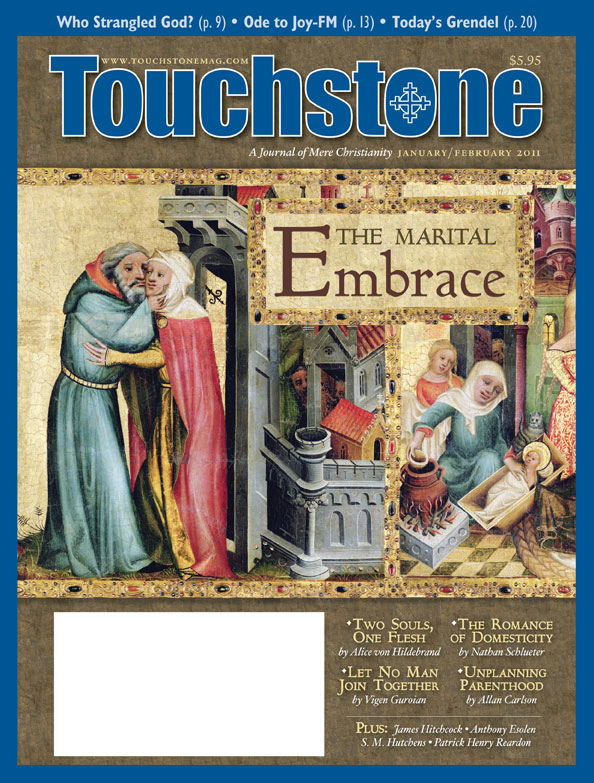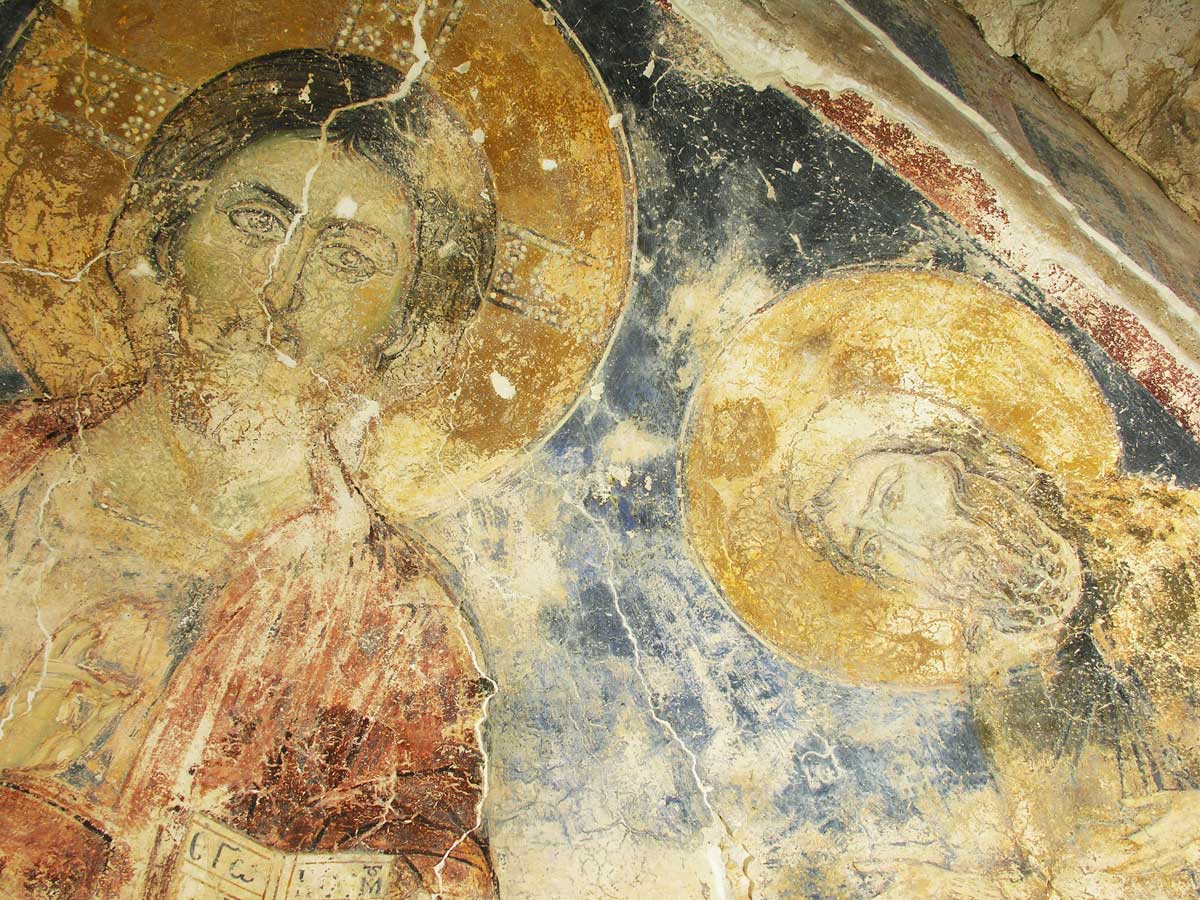Feature
Secular Grendel
Ruminations on the Monstrous Envy of the Soul-Devouring State
The monster, stalking the moors, sees in the distance the great hall Heorot rising into the night sky. Light from the hearth and the torch-lamps gleams through the windows and the open door. He hears the indistinct speech and the laughter of men, servants and warriors of the lord Hrothgar, as they rejoice in one another’s company. And the beer and the meat go round, and the court poet takes up his harp and begins to sing. It is a song of creation, of how the Measurer of all fashioned the sun and the moon and the stars, and this Middle Earth, and all that live upon it.
Grendel sees and hears all this, and hates it. His heart is wrung with envy. What he cannot share, he seeks to destroy. So when the singing and the laughter cease, he makes his single-purposed way into the hall, which he turns into the scene of another sort of feast, devouring human flesh and leaving the walls and the floor filthy with blood.
From that night on, says the poet of Beowulf, it was easy to find Danish warriors who would take their rest elsewhere than in Heorot, at some little distance from the hall. Hrothgar is left a king and no king, sitting upon his throne in vain, with no one near him to help, other than a few counselors who suggest a kind of backsliding sacrifice to the pagan gods, who are of no avail whatsoever.
A Monster of Light
Grendel in our times has mended his ways. He is still a half-human creature, to be sure, with enough perception of the good to suspect that he lacks it and to be put out when he sees that others possess it. But he no longer slouches in the darkness, waiting for his chance to strike. He is a monster of light. He does not need to burst open the hall door with a single thrust of his paw. He owns the hall. He still thirsts for blood, but he slakes that thirst in a more civilized and even what he will call a “humanitarian” way; he uses the scalpel and the forceps rather than the tooth.
He used to be an exile. But now that he has seized the Heorots of the world, he casts his enemies into exile instead. Not geographically; the new Grendel makes a great fuss over his enlightenment. He consigns them to the privacy of their little homes, where they can be kept separate from one another, and irrelevant. In the meantime, he provides his followers with enough pointless pleasure to prevent their awaking to the truth that, as another Old English poet put it, “Wyn eal gedreas”—“All joy is lost.”
Envy, says Thomas Aquinas, is the sorrow that one feels at the spiritual good of another. That definition fits Grendel well—both the monster who hates the fellowship of Hrothgar’s men, and the new despiser of faith, the theological virtue that alone can unite men and women, old and young, rich and poor, the wise and the foolish, the over-schooled and the under-schooled, in songs of hope and deeds of surprising love.
No Terrible Choices
And this warrants some thought. For we are used to considering envy as a vice—if we think of it as a vice at all—directed against someone else’s material good. This we do in two ways that are wonderfully contradictory, and that yet provide the impetus for much economic activity, and what is vaguely called “progress.”
First, we are committed to egalitarianism, a politics of universal envy. Unwilling to acknowledge that one person may be more intelligent than another, or more industrious, or more faithful to the moral law, we attribute differences in material welfare to some undefined injustice practiced by the undefined rich against the undefined poor. That spares our having to accuse anyone of a specific crime, while it allows us the sweet pleasure of feeling justified in our own eyes.
We do not say to the man on the street, “You must stop drinking,” or “You must marry the woman before you have children by her,” because that would suggest some commonsense reasons why he lives in the dingy apartment with the leaky radiators and the mold on the ceiling. We say, “You deserve to expropriate some of the goods of that fellow over there,” and encourage in him a grievance against those more fortunate than he. This encouragement costs us nothing and solves nothing, which is all the better for us, as it provides us with an endless supply of opportunities to practice it.
Second, we preach to our young people that the sole purpose in life is to pursue their material “dreams” with ruthless vigor. We mingle into the brew of our sermons a dose of humanitarianism, preferably of the telescopic variety, whereby we “help” people among whom we do not have to suffer the indignity of living. Our children are to go to college, unless they want to remain failures. Their diplomas they are to use as tickets for the lucrative or prestigious job. They will then be “successful,” meaning that they can hold their heads high at a party, when a lawyer or a doctor or a politician or a social worker asks them not what they are, but what they do. They will be the envy of their less-schooled and less wealthy neighbors.
George Bailey, the conflicted yet large-hearted hero of It’s a Wonderful Life, must constantly choose between pursuing his dreams and doing the right thing. No such terrible choice will be visited upon our young people. Let no one, not even one’s spouse and children, get in the way. It is always right to strive for the gold medal. How else, pray tell, shall we ever know the delight of stirring envy in others?
A Deaf Ear
Such envy is an acid that destroys the possibility of community, as it prevents one from delighting in the material success of another, and averts our eyes from the common good, which can only be enjoyed by being shared—the good that is good precisely because we unite with others in it. Yet Thomas Aquinas was careful to raise envy to another and far more destructive power. It is not simply that the secular world, which recognizes only material goods, must run on a material envy that undoes the community. It is rather that secularism itself is predicated upon spiritual envy. It hates the good it cannot provide.
Consider a few scenes. The first comes from Flannery O’Connor’s novel, The Violent Bear It Away. Rayber, the rationalist schoolteacher, divorced and lonely and saddled with an idiot child he tries desperately not to love, wishes to root out of the young Tarwater any notion that he is meant to be a prophet, as his half-crazy great uncle Mason Tarwater had prepared him to be. There is no savior, he says. You have to save yourself. You do that, of course, by being enlightened, especially as to the wonders of modern technology. Man’s greatest invention is the airplane, he tells the boy. “Buzzards can fly,” Tarwater replies.
But one night Tarwater slips out of the house and walks into the heart of the city. Rayber, eaten up with hatred for and fascination with everything that the uncle stood for, follows along unseen, barefoot, a coat thrown over his pajamas. He finds, in dismay and fear, that the boy has stopped at a run-down building where a gospel revival is taking place. A little crippled girl is on stage, preaching to the assembled people about the love of Jesus, and how the world didn’t want this love, how the world was hoping that Herod would find the right child and kill him.
Rayber stares through the bars of an iron grate. He cannot help but be attracted to what he sees, because he is after all a human being made by God and for God. Yet he has rejected God, and has become an anti-prophet for a bland and soulless utilitarianism. He has told the boy, “You’re going to have a chance now for the first time in your life. A chance to develop into a useful man, a chance to use your talents, to do what you want to do.”
Hearing nothing—dependent in fact upon the technology of a hearing aid merely to engage in conversation—Rayber wishes that others would hear nothing too. Says the little girl, when she catches sight of his face: “I see a damned soul before my eyes! I see a dead man Jesus hasn’t raised. His head is in the window but his ear is deaf to the Holy Word!”
Envying the Believer’s Wealth
If it seems odd to say that a man with credentials and a good job can envy a boy whose only education was in manual farm labor and in the heroes of Scripture, it is because we underestimate the fear and loathing in which secular Grendel holds the things of the spirit. The Christian dwells in a world of astonishing richness. He believes that the history of mankind and the life of the individual human being are literally adventures, wherein one goes forth and meets what by the grace or the permissive will of God comes his way; and that eternal consequences hang in the balance.
He believes that all this universe of matter and form is meant to be, and that it gives glory to its Maker. He believes with St. Francis that Brother Sun and Sister Moon and all creatures of our God and King are good; but that best of all the material creation is man himself. He can linger with love and awe upon what Milton called the “human face divine,” the face that shines with the light of intellect, and thus also with the possibility for genuine and freely chosen love.
He believes that in Jesus Christ, the Son of God, who dwelt in the flesh among us, he can be brought to newness of life, both here on his pilgrimage, and in his homeland with God beyond the grave. He believes, if he understands his faith aright, in what Eliot called “endless humility,” the virtue that the envious dare not acknowledge, but that opens the heart of the believer to the spiritual good of another, especially if that good marks the other’s superiority.
All this wealth the believer enjoys; then comes Grendel the secularist, not to lift himself to the height of the believer, a feat he cannot accomplish, but to bring the believer down with scorn, even if it means denying all meaning to his own life—except perhaps that of ensuring that no one henceforth will believe in any ultimate meaning. So he says that the only adventure is that of random and pointless chance, and nothing but one’s material welfare hangs in the balance.
Nothing in the universe was meant to be, and there is no such thing as glory. There is too much wrong with the material world to believe that God made it. Creation, despite what during some ages may be a fashionable environmentalism, is evil. The human being is an accidental result of some evolutionary mutations. He does not possess anything like a stable identity. Even self-consciousness is an illusion.
No God dwelt among us. There is no newness of life. Better to bluff mightily, call oneself bright, and compel others to admit it, than to acknowledge that there are mysteries one cannot fathom. In all of this, the secularist enjoys a fierce and sulfurous pleasure, that of the spoilsport or the killjoy, who hates what he cannot participate in.
Grendel in the Locker Room
Consider another scene. Amazingly enough, it is still a common one in America. Football players, helmets in their hands, kneel in the locker room, as one of their number—not the coach, who might lose his job if he did so—leads them in prayer. Theirs is a hard and dangerous game, and the pain to which the players freely subject themselves tends to bring them together. They ask their Father in heaven to help them do their best on the field, and bring them to the end whole and sound.
For a few moments they are more than teammates. They are fellow worshipers of the one God. The youth who kneels beside you is now someone other than the second-string wide receiver. He is a creature made in the image and likeness of God; he is your brother; he and you are together in the solemn witness to a world beyond the world. You are united from above.
What does Grendel boast that can compare? He engages in parodies of union. He binds together man and wife with slipknots, and is more interested, in the financial sense of that word, too, in their dissolution than in their hard-won union. He musters a political party, whence those who join him will expect profit for their individual interests. He invents the fiction of a corporation, “owned” by distant shareholders who know nothing of one another, and almost nothing of the business in which they buy shares. At the healthiest, he enlists people’s loyalties for some ballclub, that they may pack into a stadium and pretend, for a few hours, that their passions are directed toward something of genuine and shared meaning.
So Grendel steps into the locker room. He carries a sheaf of court opinions. He intones holy words about the “separation of church and state,” and blesses himself with the conviction that he really means to protect an outsider, maybe an unbeliever, from having to feel left out of the prayer. In other words, he means to protect some other putative Grendel who, looking with envy upon a union he cannot enjoy, would prefer to destroy that union rather than join it or humbly let it alone.
He says that such prayers separate people from one another, but the truth is that he, Grendel, is the great separator, and that his power and authority depend upon it. Otherwise, he would not exercise the power of a totalitarian—for why on earth should a monster of the nation-at-large trouble himself about the simple prayer of a few young men in some small town?
A Community in Celebration
One final scene. It is the feast of Our Lady of Mount Carmel. In a hill town among the slate quarries of Pennsylvania, the parishioners of the church, almost all of them the descendants of Italian immigrants, come together to celebrate the patronal day. The priest, carrying in his robed hands the monstrance with the Holy Eucharist, leads a procession of singing and praying people up and down the streets. Now and then they stop for a while, praying the rosary.
Old men and ladies for whom the procession would be too strenuous wait on their porches or at street corners, praying along when the line of people comes their way. The celebration will continue into the evening, when the people will gather for food and drink and innocent games. It is the town’s greatest expression of its common heritage, and common life.
Nor is it anything new. It unites the people with their ancestors of centuries ago, who celebrated in like fashion, all the way back at least to the thirteenth century, when the pope concluded the Fourth Lateran Council by inaugurating the new feast of Corpus Christi, and Christians in towns and villages all across Europe greeted the feast with an outpouring of devotion and local creative activity unparalleled since ancient Athens.
They revived that old and odd form of art known as drama, and staged, for the delight and the edification of their fellow townsmen, cycles of popular plays to celebrate the feast, plays that in succession took their audiences from the fall of Satan and the creation of Adam to the Last Judgment. Everyone was involved—the cleric who wrote the texts, the carpenters who nailed up the floats, the guildsmen who played the parts, and the people who followed the floats along through the streets and prayed when they stopped at the churches and then watched the show.
Aping the Celebration
What does Grendel have? He knows nothing of a genuinely popular celebration, since he can acknowledge nothing beyond the self, or a collective of selves, the state. He envies the good fellowship of such a feast, while at the same time looking with affected contempt upon its object.
But he will ape the celebration. Sometimes Grendel will enlist all the children in a school to affirm some political position, as for instance that the earth is our mother and we must all recycle. Or he will be glad to allow half-clad or naked men to parade down the main street, celebrating their failure to become normal husbands and fathers. The “gay pride” parade derives its impetus from the assertion of a community-dissolving individualism on the one hand—as the paraders recognize no limits upon their will to do with their bodies what they please—and on the other hand an adolescent defiance of others who would object, even if those others are not actually present to watch them as they stroll. It is in both ways divisive.
The Psalmist says, “Put not thy trust in princes,” but Grendel does not understand what else there is to trust, if not the princes of politics or, these days, the priests of the technocracy. For him, all things are but opportunities to exalt his own and silence the opposition.
In the end, Grendel envies what I have seen in the faces of those of my students who have grown in wisdom and understanding, who know the Lord, and who trust that their lives are in his hands. That something is of a different order entirely from pleasure, which is but its shadow—pleasure, whereof Grendel at his most enthusiastic can provide only a fevered and degraded form.
That something is joy. It beams from the core of their beings. All who see it must rejoice in it, or turn aside, like Milton’s Satan, with jealous leer malign. A graduate of the University of Grendel can toss his cap into the air and holler, and look forward to nights of drink and sexual excitation, followed by a career and money and death. There is in his eyes the glare of the hunter and the hunted. But they who look to God dwell in another world entirely. It is a world of childlike love and wonder. Grendel sneers—and trembles. •
Anthony Esolen is Distinguished Professor of Humanities at Thales College and the author of over 30 books, including Real Music: A Guide to the Timeless Hymns of the Church (Tan, with a CD), Out of the Ashes: Rebuilding American Culture (Regnery), and The Hundredfold: Songs for the Lord (Ignatius). He has also translated Dante’s Divine Comedy (Random House) and, with his wife Debra, publishes the web magazine Word and Song (anthonyesolen.substack.com). He is a senior editor of Touchstone.
subscription options
Order
Print/Online Subscription

Get six issues (one year) of Touchstone PLUS full online access including pdf downloads for only $39.95. That's only $3.34 per month!
Order
Online Only
Subscription

Get a one-year full-access subscription to the Touchstone online archives for only $19.95. That's only $1.66 per month!
bulk subscriptions
Order Touchstone subscriptions in bulk and save $10 per sub! Each subscription includes 6 issues of Touchstone plus full online access to touchstonemag.com—including archives, videos, and pdf downloads of recent issues for only $29.95 each! Great for churches or study groups.
Transactions will be processed on a secure server.
more on literature from the online archives
more from the online archives
calling all readers
Please Donate
"There are magazines worth reading but few worth saving . . . Touchstone is just such a magazine."
—Alice von Hildebrand
"Here we do not concede one square millimeter of territory to falsehood, folly, contemporary sentimentality, or fashion. We speak the truth, and let God be our judge. . . . Touchstone is the one committedly Christian conservative journal."
—Anthony Esolen, Touchstone senior editor












